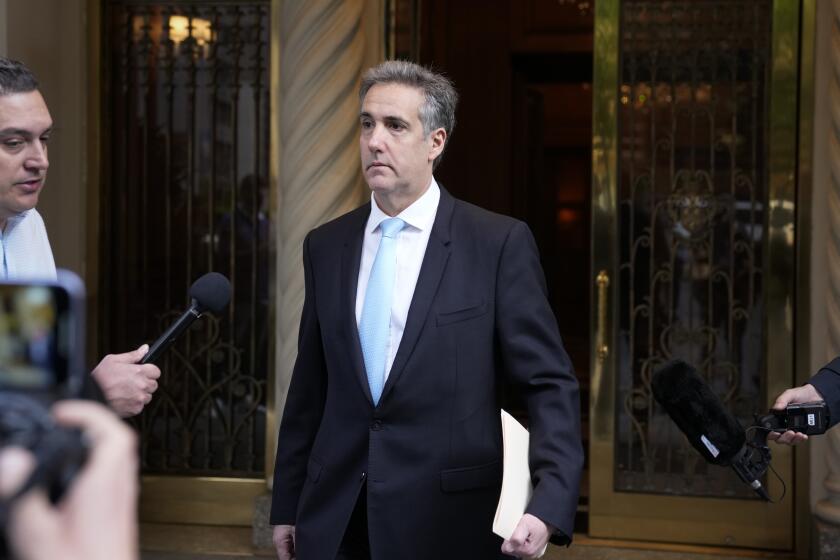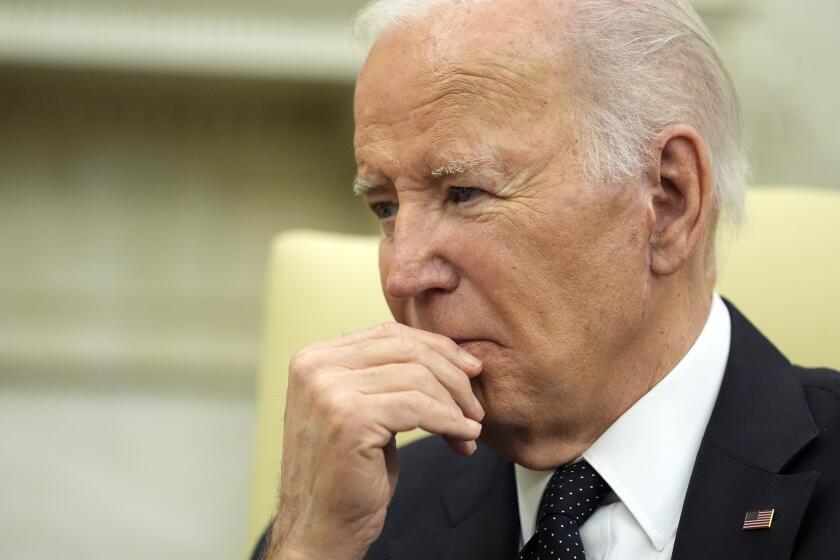U.S. Watching for Post-Afghan Soviet Foreign Policy Initiatives
Officials traveling with Secretary of State George P. Shultz to Moscow this week will be looking for signs that the Soviets, in the wake of their Afghanistan withdrawal, will be intent on taking a strategic initiative in foreign affairs to ease their Afghan defeat.
Some Reagan Administration officials are drawing a parallel with the United States’ post-Vietnam situation, when the Richard M. Nixon Administration made its historic opening to China and concluded the first strategic arms agreement with the Kremlin. These officials believe the Soviets are entering a “hyperactive phase” in foreign affairs--with an initial focus on efforts toward a settlement in the Middle East.
“Certainly I would argue against those people who predict that the Soviets need a breathing space after Afghanistan and will pull back on foreign initiatives,” one senior State Department official said. “That’s baloney. They know if they pull back, they’ll lose influence. They’ll stop being viewed as a world power.”
Officials predicting increased activism by Moscow point to the continuing Mideast conflict as an area of promise. For example, they cite Soviet leader Mikhail S. Gorbachev’s apparent overture to Israel earlier this month, when he urged Palestine Liberation Organization chief Yasser Arafat, for the first time, to explicitly recognize the Jewish state’s right to exist.
Gorbachev also told California industrialist Armand Hammer that he wants to “make peace between Arabs and Israel,” according to U.S. officials quoting Hammer.
And Soviet Foreign Minister Eduard A. Shevardnadze, after he and Shultz signed the Afghan accords in Geneva last week, said the agreement “stimulates the positive processes in terms of settlement of regional conflicts, including the problem of the Middle East.” Shevardnadze is expected to make a trip to the Mideast soon.
There are fewer public signs that the Soviets intend to push as hard on the arms control front, where a new strategic arms reduction treaty appears virtually impossible to achieve before the May 29-June 2 Moscow summit meeting between Gorbachev and President Reagan.
Still, Gorbachev told American businessmen last week, “We are convinced that this goal (of a 50% cut in offensive nuclear arms) is attainable in the immediate future if both sides are guided by the fundamental approach agreed” to at the December summit in Washington.
“Gorbachev is under serious leadership pressure at home,” pressed by personal challenges from No. 2 man Yegor K. Ligachev and the nationality controversy over Armenia, one official said. And although the Afghanistan pullout may not yet have hurt him, it could. “He needs as many foreign policy successes as he can get, including a new arms agreement,” this official said.
Another Soviet analyst said that “the strategic surprise of the summit could be a START agreement. I still wouldn’t rule that out if the two leaders want it.”
Expectations of an active new phase in Kremlin foreign policy were treated somewhat warily by other Soviet specialists, however.
“The Soviets don’t need the withdrawal from Afghanistan to motivate them,” said Arnold L. Horelick, a RAND Corp. expert on Soviet affairs and former senior analyst at the CIA.
“Gorbachev has great interest and incentive to look successful in foreign affairs these days, but I cannot imagine anything that he is not already doing,” except perhaps with China, Horelick added.
Beijing has long opposed any improvement in Sino-Soviet relations until Moscow reduces its troops along their common border, withdraws its forces from Afghanistan and stops supporting the Vietnamese-based regime of Cambodia.
“Gorbachev may package the Afghan withdrawal with some unilateral force reduction on the (Chinese) border, of the kind the Soviets have been considering, to call for a summit meeting with Beijing,” Horelick said. “But it wouldn’t be done to cover a major defeat. He’s wanted to do it anyway.”
Moreover, there are no obvious regional issues that promise quick and easy settlement and that could be presented to the world by the Kremlin as strategic victories.
The Soviets long have flirted with the notion of supporting a U.N. resolution that would impose an arms embargo on Iran for refusing to join a cease-fire in its war with Iraq. But now, following the Afghan settlement, Iran is in a position to make a great deal of trouble for the Soviets--by encouraging the fundamentalist Islamic rebels in Afghan refugee camps inside its territory to continue attacking the retreating Soviets.
Gorbachev is not being blamed for the Afghanistan conflict--one of his predecessors, Leonid I. Brezhnev, is bearing the onus for that--but if the withdrawal becomes bloody, he may become the target of criticism. So until Moscow’s forces are totally out, one official predicted, Gorbachev is unlikely to risk antagonizing the Tehran regime.
Shultz will be taking Richard W. Murphy, his assistant secretary for the Middle East and South Asia, to Moscow for substantive talks about these regions. But more appears to divide than unite the superpowers on their approach to the Arab-Israeli conflict, including terms for a Mideast settlement.
These include whether Jerusalem should be an international city, how much of the West Bank should be given up by Israel to the Palestinians and the nature of Palestinian rule to be set up there. Washington and Moscow even disagree on whether an international Mideast peace conference would be only a fig leaf for direct Arab-Israeli negotiations or would have substantive powers to guide, if not impose, a settlement on Israel.
More to Read
Start your day right
Sign up for Essential California for news, features and recommendations from the L.A. Times and beyond in your inbox six days a week.
You may occasionally receive promotional content from the Los Angeles Times.






